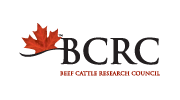Quantifying the Canadian beef industry's impact on biodiversity
| Project Code: | ENV.07.17 |
| Completed: | In Progress. Results expected in March 2023. |
Project Title:
A regionalized life cycle impact assessment model for the quantification of Canadian Beef production impacts on biodiversity
Researchers:
Tim McAllister, Ph.D. and Kim Ominski, Ph.D. tim.mcallister@agr.gc.ca
Tim McAllister, Ph.D. (Agriculture and Agri-Food Canada Lethbridge); Kim Ominski, Ph.D. (University of Manitoba); Roland Kroebel Ph.D., Steve Javorek M.Sc. and Kerry LaForge, (Agriculture Agri-Food Canada), Edward Bork Ph.D., Cameron Carlyle Ph.D., JC Cahill Ph.D. (University of Alberta); Getahun Legesse (Manitoba Agriculture); Carrie Selin (Alberta Biodiversity Monitoring Institute); Stephen Davis Ph.D. (Canadian Wildlife Service / University of Regina); Tom Harrison M.Sc. (South of the Divide Conservation Action Program) and Kristine Tapley M.Sc.(Ducks Unlimited)
Background:
Research funded under the second Beef Science Cluster has revealed that there is relatively little information about how biodiversity is impacted by Canadian beef production. Solid data is needed to assess whether our industry is having positive or negative impacts, and whether our environmental practices are improving or not. Detailed biodiversity information is available for Alberta, but not for the rest of Canada. Historical data collected through PFRA, provincial or community pastures or other public sources may help fill some of these gaps. However, there is no commonly accepted method of analyzing or presenting biodiversity results. This makes it difficult to compare biodiversity statistics reported by different groups.
Objectives:
To identify the main drivers of changes in biodiversity and compile and build indicators to address biodiversity loss at regional and national scales. Researchers will also propose a life cycle inventory assessment (LCIA) model to address the impacts of beef production on biodiversity.
What They Will Do:
The AAFC project lead is involved in the Livestock Environmental Assessment and Performance partnership initiative of the United Nation’s Food and Agriculture Organization (FAO-LEAP), ensuring international credibility and applicability.
Characterization of typical beef farming scenarios: A research project that was funded by a previous Beef Science Cluster will be expanded to look at the effects of grazing management on native and tame pastures using data from AAFC, Canadian Wildlife Service, Ducks Unlimited, and StatsCan. Factors contributing to biodiversity loss, maintenance or improvement will be identified (e.g. beef, crop, and oilfield production, urban development).
Literature review of datasets and indicators of changes in biodiversity: biodiversity indicators that have been established elsewhere will be identified and compared. All available data sets will be used to populate these indicators. The project team will develop a draft guidance document for biodiversity assessment in livestock production, with input from the FAO-LEAP Biodiversity Group. Feedback from the LEAP committee will be incorporated as a biodiversity assessment model is developed for Canada.
Characterization of biodiversity status in Canada and development of biodiversity indicators at regional and national scales: all available data will be used to identify which plants, birds and animals (including threatened species) live throughout Canada. Additional data regarding biodiversity and pasture health will be collected using on the ground pasture surveys.
Proposal of the LCIA model and identification of gaps in the current LCIA framework: A Life Cycle Inventory Assessment model for biodiversity will be developed, tested, and compared with existing models. Remaining biodiversity information data gaps will be identified to inform future biodiversity monitoring and research initiatives.
Implications:
This project will analyze historical information regarding how cattle production practices can reduce, maintain or improve plant, animal and bird biodiversity to support the development of best practices for sustainable beef production in Canada and internationally.








